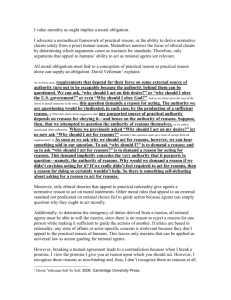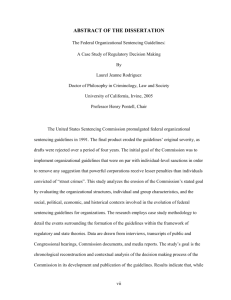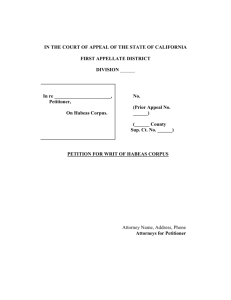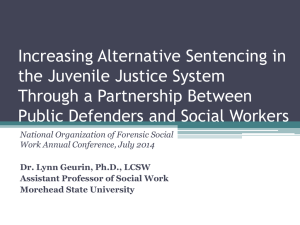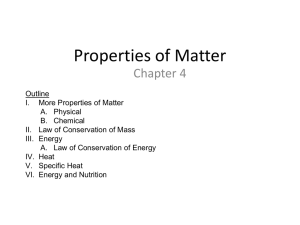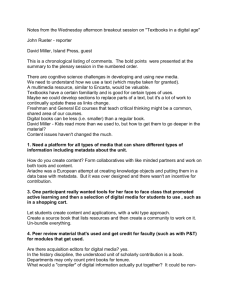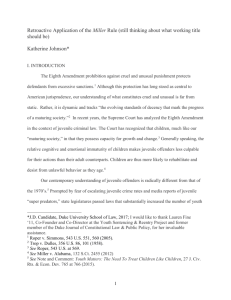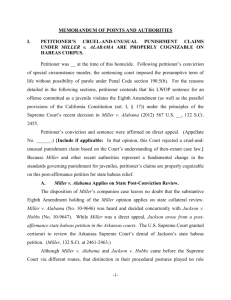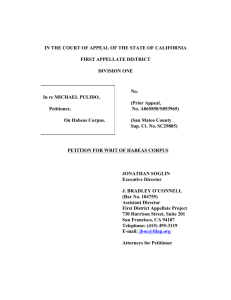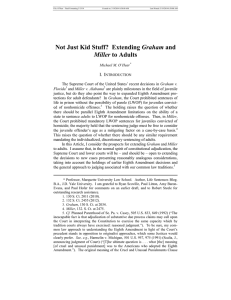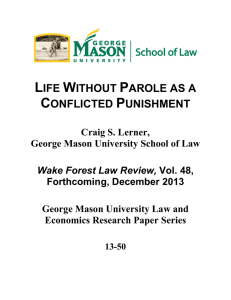6. GROUNDS FOR RELIEF Ground 1 Sentences of life without the
advertisement
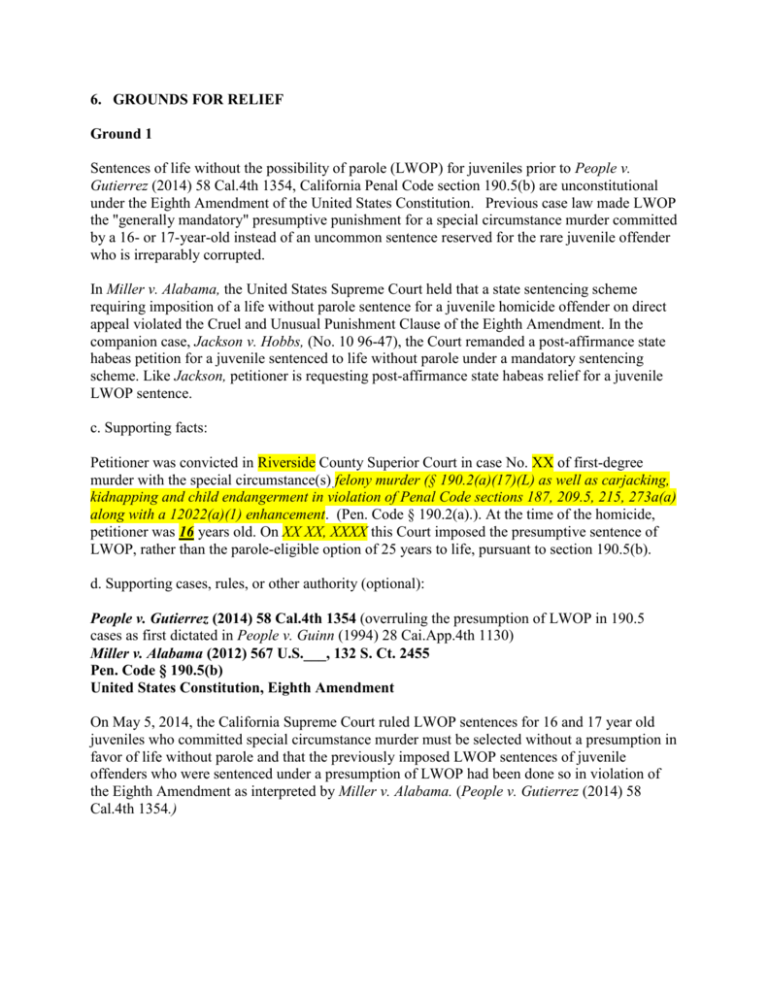
6. GROUNDS FOR RELIEF Ground 1 Sentences of life without the possibility of parole (LWOP) for juveniles prior to People v. Gutierrez (2014) 58 Cal.4th 1354, California Penal Code section 190.5(b) are unconstitutional under the Eighth Amendment of the United States Constitution. Previous case law made LWOP the "generally mandatory" presumptive punishment for a special circumstance murder committed by a 16- or 17-year-old instead of an uncommon sentence reserved for the rare juvenile offender who is irreparably corrupted. In Miller v. Alabama, the United States Supreme Court held that a state sentencing scheme requiring imposition of a life without parole sentence for a juvenile homicide offender on direct appeal violated the Cruel and Unusual Punishment Clause of the Eighth Amendment. In the companion case, Jackson v. Hobbs, (No. 10 96-47), the Court remanded a post-affirmance state habeas petition for a juvenile sentenced to life without parole under a mandatory sentencing scheme. Like Jackson, petitioner is requesting post-affirmance state habeas relief for a juvenile LWOP sentence. c. Supporting facts: Petitioner was convicted in Riverside County Superior Court in case No. XX of first-degree murder with the special circumstance(s) felony murder (§ 190.2(a)(17)(L) as well as carjacking, kidnapping and child endangerment in violation of Penal Code sections 187, 209.5, 215, 273a(a) along with a 12022(a)(1) enhancement. (Pen. Code § 190.2(a).). At the time of the homicide, petitioner was 16 years old. On XX XX, XXXX this Court imposed the presumptive sentence of LWOP, rather than the parole-eligible option of 25 years to life, pursuant to section 190.5(b). d. Supporting cases, rules, or other authority (optional): People v. Gutierrez (2014) 58 Cal.4th 1354 (overruling the presumption of LWOP in 190.5 cases as first dictated in People v. Guinn (1994) 28 Cai.App.4th 1130) Miller v. Alabama (2012) 567 U.S.___, 132 S. Ct. 2455 Pen. Code § 190.5(b) United States Constitution, Eighth Amendment On May 5, 2014, the California Supreme Court ruled LWOP sentences for 16 and 17 year old juveniles who committed special circumstance murder must be selected without a presumption in favor of life without parole and that the previously imposed LWOP sentences of juvenile offenders who were sentenced under a presumption of LWOP had been done so in violation of the Eighth Amendment as interpreted by Miller v. Alabama. (People v. Gutierrez (2014) 58 Cal.4th 1354.) Ground 2 Petitioner is entitled to resentencing because this Court was not presented with evidence relating to (and failed to give paramount consideration to) the "hallmark features" of youth that render a juvenile offender such as petitioner less culpable than an adult. Miller v. Alabama "require[s] [the sentencing court] to take into account how children are different, and how those differences counsel against irrevocably sentencing them to a lifetime in prison." (Miller, 132 S.Ct. at 2469.) The sentencing court must give paramount weight to the developmental characteristics delineated in Miller, including "immaturity, impetuosity, and failure to appreciate risks and consequences." (Id. at 2468.) The sentencing court must recognize the "transience" of youthful recklessness and a juvenile offender's greater "capacity for change" and prospects for rehabilitation. (Id. at 2467-2468 & fn. 7.) Miller also requires that the sentencing court give due weight to the mitigating effect of background and environmental circumstances which may have contributed to the minor's offense, including the role of "familial and peer pressures." The court must ""tak[e] into account the family and home environment that surrounds [the minor]- and from which he usually cannot extricate himself-no matter how brutal or dysfunctional." (Miller, 132 S. Ct. at 2468.) Miller further requires the court to consider "the circumstances of the homicide offense, including the extent of his participation in the conduct and the way familial and peer pressures may have affected him." Finally, the court must consider "the incompetencies associated with youth-for example, his inability to deal with police officers or prosecutors (Including on a plea agreement) or his incapacity to assist his own attorneys." (Id.) c. Supporting facts: My counsel did not fully investigate and present and this Court failed to fully consider and give appropriate weight to, the hallmark features of youth and my background and environmental factors during my sentencing pursuant to Cal. Penal Code section 190.5. d. Supporting cases, rules, or other authority (optional): Roper v. Simmons (2005) 543 U.S. 551 Graham v. Florida (2010) 560 U.S. 48 Miller v. Alabama (2012) 567 U.S. __, 132 S.Ct. 2455 People v. Gutierrez (2014) 58 Cal.4th 1354 Ground 3 Petitioners juvenile LWOP sentence is "cruel or unusual" under the California Constitution. The newly enacted Penal Code section 1170(d)(2) that allows some juvenile offenders to petition the sentencing court to "recall" an LWOP sentence after fifteen years in custody does not resolve the above constitutional claims because it does not provide an alternative forum for consideration of those claims and any resentencing would occur pursuant to the constitutionally defective Penal Code section 190.5. (See People v. Gutierrez, (2014) 58 Cal.4th 1354, 1385-1387.) c. Supporting facts: Petitioner was convicted in Riverside County Superior Court in case No. XX of first-degree murder with the special circumstance(s) felony murder (§ 190.2(a)(17)(L) as well as carjacking, kidnapping and child endangerment in violation of Penal Code sections 187, 209.5, 215, 273a(a) along with a 12022(a)(1) enhancement. (Pen. Code § 190.2(a).). At the time of the homicide, petitioner was 16 years old. On XX XX, XXXX this this Court imposed the presumptive sentence of LWOP, rather than the parole-eligible option of 25 years to life, pursuant to section 190.5(b). d. Supporting cases, rules, or other authority (optional): Article I, section 17, California Constitution Graham v. Florida (2010) 560 U.S. 48 Miller v. Alabama (2012) 567 U.S. __, 132 S. Ct. 2455 In re Lynch (1972) 8 Cal.3d 410 In re Nunez (2009) 173 Cal.App.4th 709, 724-733 People v. Dillon (1984) 34 Cal.3d 441 PRAYER FOR RELIEF Petitioner is without remedy save by writ of habeas corpus. Wherefore, Petitioner prays that this Court: 1. Issue an Order to Show Cause why relief should not be granted in light of People v. Gutierrez (2014) 58 Cal.4th 1354 and order Respondent to file a Denial within 60 days; 2. Appoint Counsel to represent Petitioner; 3. Issue an Order directing Respondent to provide reasonable discovery; 4. Declare the rights of parties; and 5. Grant any and all other relief necessary to a just resolution of this case. Respectfully submitted, ________________________
